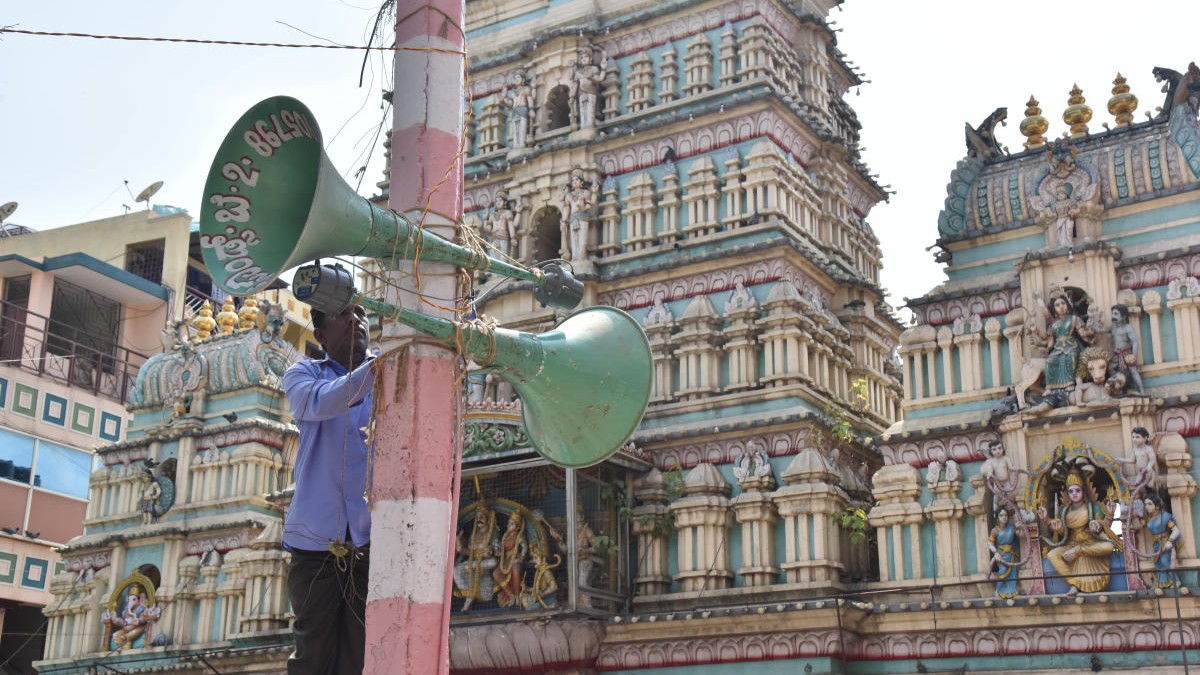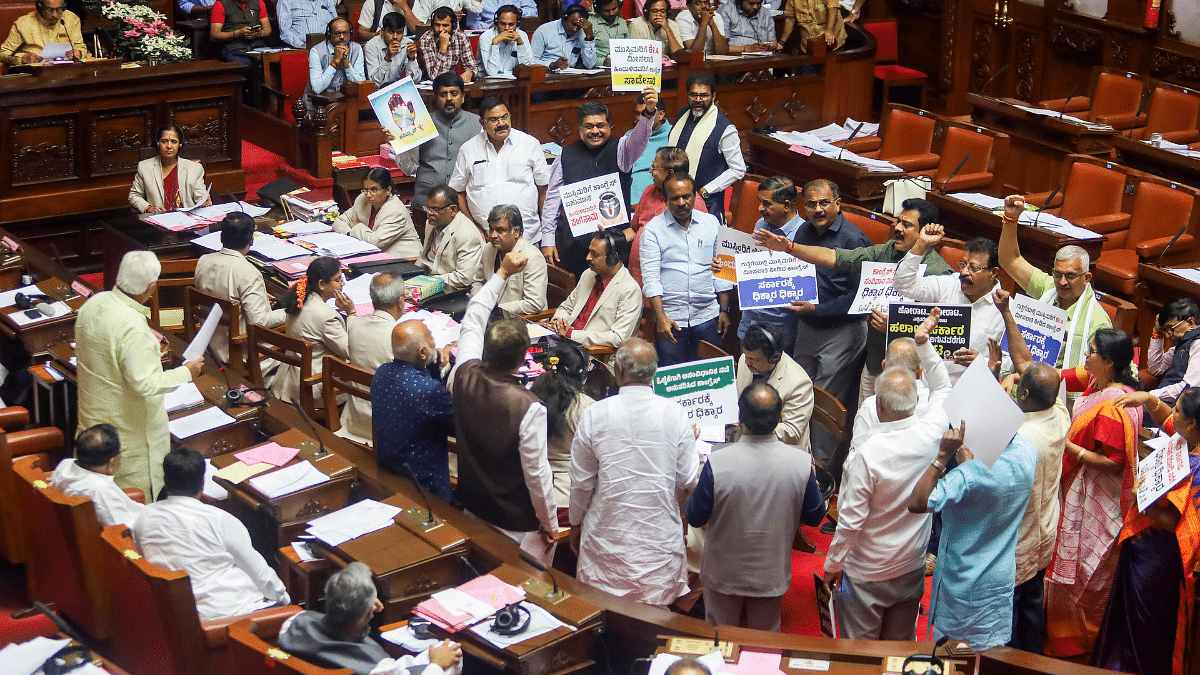The Karnataka Assembly witnessed heated arguments after a BJP MLA accused the police of targeting Hindu festivals by citing repeated rule violations. He alleged that organizers were unfairly restricted with conditions on processions, sound systems, and routes, causing difficulties for communities celebrating long-standing traditions. According to him, the selective enforcement of rules hurt sentiments and raised suspicions of bias against Hindu religious practices. His remarks stirred chaos in the Assembly, with opposition leaders echoing the allegations and demanding answers from the ruling government, while ministers defended the police actions.
The MLA emphasized that religious freedom was a fundamental right, and festival celebrations held cultural, emotional, and spiritual significance for millions of Hindus. He claimed that the police imposed curfews on timings, reduced routes, and even restricted traditional instruments during festivals. These measures, he argued, were not applied to other communities, leading to frustration and feelings of discrimination. He further warned that if such restrictions continued, trust between communities and the state would be damaged, creating long-term political and social consequences.
The government, however, defended the police, stating that restrictions were in place to ensure law and order, control noise pollution, and prevent communal flare-ups. Ministers argued that such preventive measures were necessary in a state as diverse as Karnataka, where festivals often involve large crowds and sensitive areas. They dismissed accusations of bias, accusing the opposition of politicizing cultural issues for electoral gains. The emotional tone of the debate highlighted deep divisions in perspectives on balancing tradition and law.

Community Concerns and Reactions
Outside the Assembly, community organizations and temple committees expressed anger over the restrictions, claiming that the state was undermining cultural heritage. Many argued that festivals had been celebrated peacefully for decades and sudden changes were unfair. They threatened demonstrations if the government failed to intervene.
Political observers noted that such debates could polarize voters, especially ahead of elections. The controversy underscored the tension between maintaining harmony and respecting tradition, with both sides unwilling to compromise.
The BJP MLA’s statement also triggered heated discussions within social circles beyond politics. Many young festival volunteers who actively participate in Ganesh Chaturthi, Navaratri, and local temple processions voiced frustration over what they saw as unnecessary hurdles. They claimed that enthusiasm for cultural celebrations was fading because youth were forced to spend more time on paperwork than on actual community service. Parents too expressed concern, saying the lack of smooth organization diminished the festive spirit for children. These sentiments suggested that the controversy touched grassroots realities, not just high-level political battles inside the Assembly.
Several Congress MLAs countered the narrative by producing data on permissions granted to Hindu festivals over the past two years. They argued that the majority of requests were approved with only minor modifications. They emphasized that the government had invested in improving festival infrastructure, including crowd control barriers, traffic management, and emergency services. According to them, these measures proved the government’s commitment to supporting religious events while ensuring safety. However, the BJP dismissed this defense as selective presentation of numbers, insisting that behind the statistics were stories of frustration and community dissatisfaction.
Meanwhile, the Speaker of the Assembly urged members to refrain from turning cultural issues into communal debates. He reminded the House that Karnataka was home to diverse traditions, and any attempt to politicize them risked eroding social harmony. His appeal, however, did little to calm the heated exchanges, with opposition members demanding a formal inquiry into police practices. The Speaker finally agreed to direct a legislative committee to examine the complaints, though ruling members questioned whether such a move was politically motivated. The compromise temporarily eased tensions but left underlying mistrust unresolved.
Religious scholars and cultural historians later commented that Karnataka’s festivals had historically evolved through community cooperation and mutual understanding. They stressed that policing traditions were not inherently wrong but needed to be balanced with local sensitivities. For centuries, festivals had played a unifying role, bringing together diverse castes and communities. However, they warned that if disputes over permissions continued, the very spirit of inclusivity could be lost. Their remarks highlighted the stakes involved: the issue was not simply about permissions or politics, but about safeguarding Karnataka’s cultural continuity.


In response, ministers from the ruling government countered that the MLA was exaggerating the issue for political mileage. They maintained that police restrictions were implemented only in cases where security concerns were genuine, such as congested areas, traffic bottlenecks, or previous incidents of violence. They argued that the BJP was attempting to paint a picture of victimhood for Hindus when in reality the same rules applied to all religious gatherings. However, the opposition demanded that the government furnish proof of equal treatment, citing instances where Hindu festivals alone faced disproportionate scrutiny.
The Road Ahead
The issue remains unresolved as the Assembly debate ended without consensus. The matter may intensify if communities escalate protests, making it a key political flashpoint.

The Assembly turned turbulent as both sides traded accusations of communal politics. The BJP insisted that Hindu traditions were being targeted because of political appeasement, while the ruling government accused the opposition of stoking communal sentiments to mobilize votes. The Speaker was forced to intervene multiple times to restore order. Media outlets covering the proceedings noted how the debate reflected broader tensions in Karnataka’s political landscape, where cultural identity and religious freedom have become sensitive touchpoints in public discourse.
Outside the Assembly, several Hindu religious organizations expressed solidarity with the BJP MLA’s claims. Leaders of these organizations alleged that permission for traditional practices such as carrying idols, using musical instruments, or holding night-time processions was often delayed or denied. They argued that the excessive bureaucracy surrounding permissions amounted to an indirect attempt to discourage festival celebrations. Some groups even warned that they would take to the streets in protest if the government failed to address their grievances, further escalating the controversy.
Civil society, however, presented a divided response. While some activists supported the demand for easing restrictions on religious festivals, others stressed the importance of upholding law and order. Human rights groups emphasized that public celebrations must not infringe upon the rights of others, particularly in terms of noise levels and road blockages. They argued that while religious freedom was vital, it had to coexist with citizens’ rights to peace and safety. This dual perspective highlighted the complexity of the issue, where cultural expression and civic responsibilities often intersect.
Legal experts also weighed in, noting that the Constitution guarantees freedom of religion but allows reasonable restrictions in the interest of public order, morality, and health. They argued that the real challenge lay in defining what was “reasonable” and ensuring consistent enforcement across communities. If the government applied different standards to different groups, it could open itself to accusations of bias. This legal dimension added another layer of seriousness to the Assembly debate, as members clashed over whether Karnataka’s police were operating within constitutional limits.
Political analysts suggested that the controversy could significantly influence Karnataka’s upcoming electoral battles. The BJP’s accusations tapped into a broader narrative of Hindu identity and cultural pride, themes that have resonated strongly with segments of the electorate in the past. Meanwhile, the ruling party sought to portray itself as a responsible guardian of law and order, appealing to voters who prioritize stability. The clash of narratives highlighted how even routine administrative actions, such as granting festival permissions, could become powerful tools in political strategy.
The emotional nature of the debate was also reflected in the language used by both sides. The BJP framed the restrictions as a direct attack on religious sentiment, while the ruling government warned against communal polarization. The tone of the debate revealed how deeply religious traditions are tied to Karnataka’s cultural fabric, making any regulation of festivals a politically sensitive move. Observers noted that even though the debate began with a local grievance, it quickly escalated into a broader ideological battle with statewide implications.
Community elders and temple committees urged for dialogue between the government and festival organizers. They argued that a collaborative framework could resolve the issue by balancing safety with tradition. Suggestions included setting clear guidelines for permissions, involving community leaders in decision-making, and ensuring that restrictions were temporary and justified. Such measures, they believed, could rebuild trust and prevent the politicization of cultural matters. However, whether such dialogue would materialize remained uncertain, given the charged political atmosphere.
Ultimately, the Assembly debate concluded without any immediate resolution, leaving the issue unresolved but highly prominent in public discourse. Both sides claimed victory in framing the narrative—one as defenders of tradition, the other as protectors of law. The matter is likely to remain alive in the coming months, as communities continue to demand clarity and fairness in festival regulations. Whether the controversy leads to policy changes or simply fuels further polarization will depend on how the government and opposition choose to handle the issue moving forward.
Follow: Karnataka Government
Also read: Home | Channel 6 Network – Latest News, Breaking Updates: Politics, Business, Tech & More

